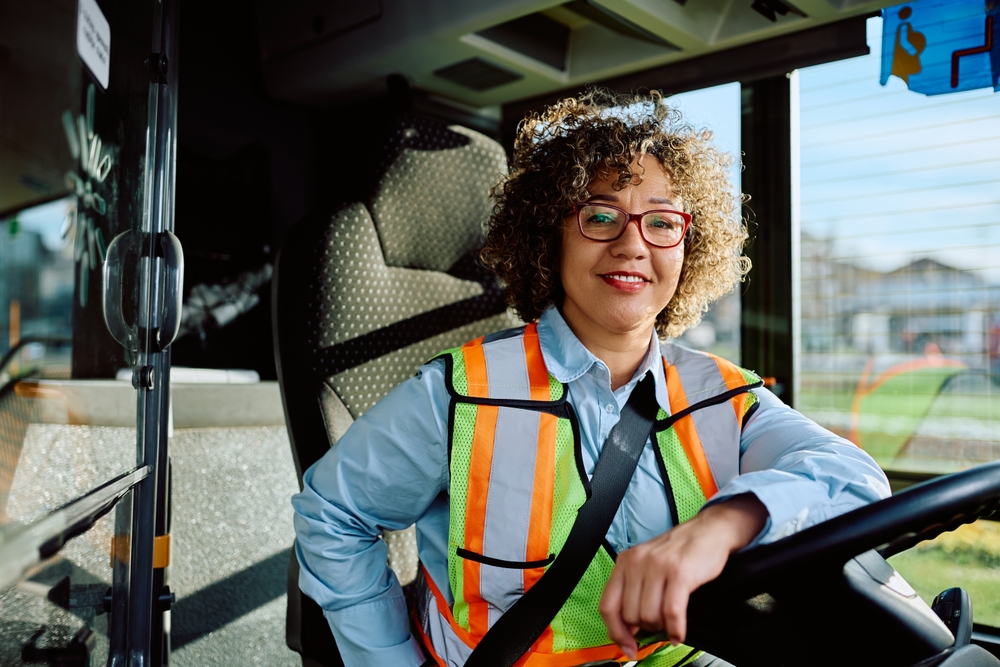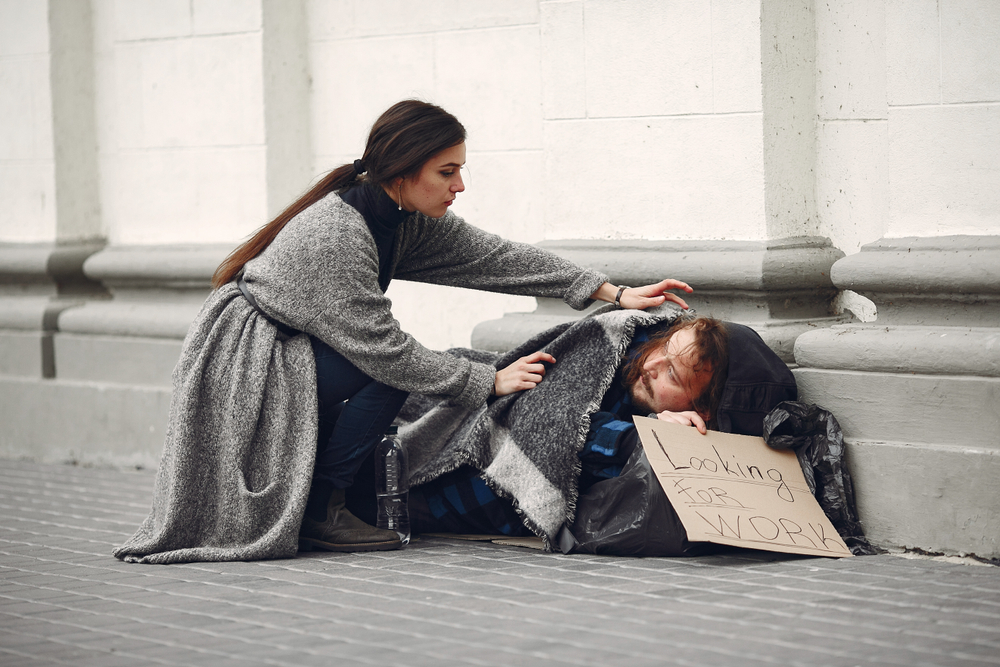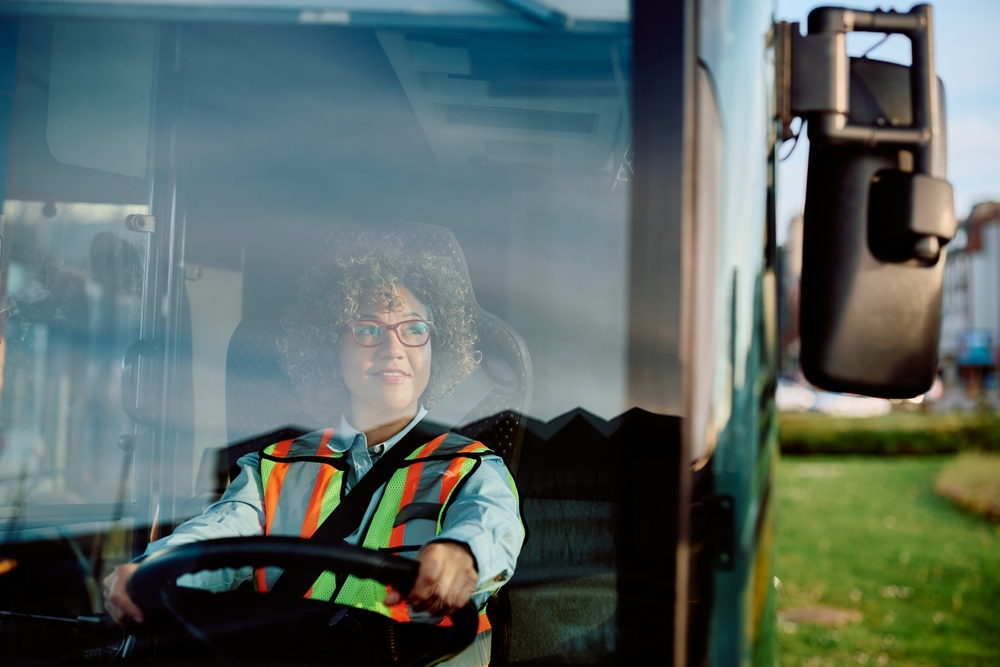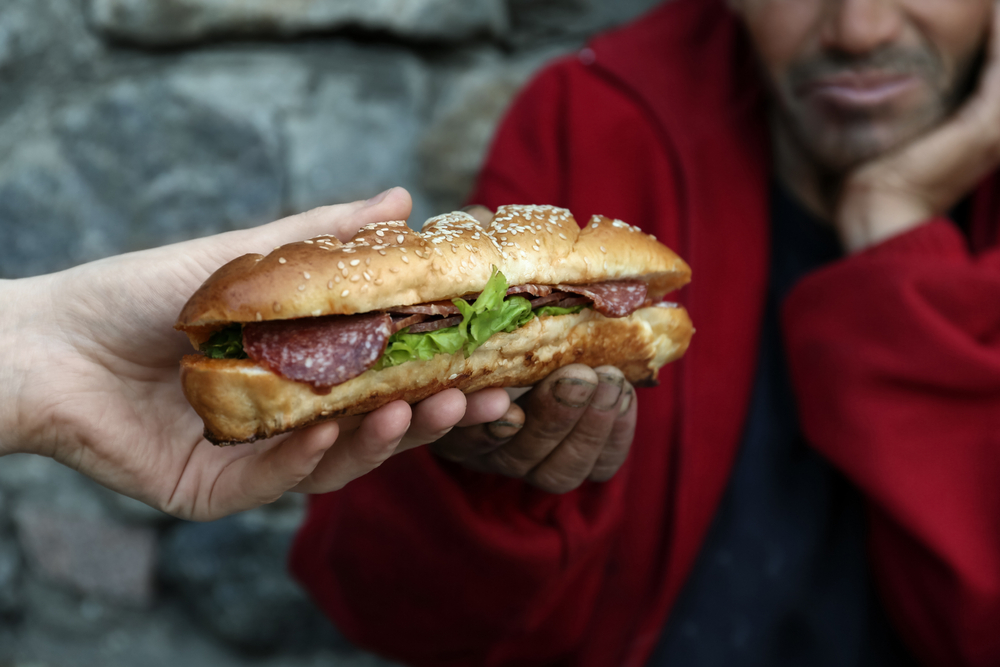Security Footage Shows Bus Driver Checking on Unusually Quiet Passenger – And Changing His Life Forever

Something felt wrong about the man sitting in the corner. Natalie Barnes had driven Milwaukee County Transit System routes for two years and developed instincts about her passengers. Richard boarded her bus about once monthly, always friendly and chatty. On this particular October night in 2018, he sat silent and somber while Wisconsin’s autumn chill crept through the streets.
Surveillance cameras mounted throughout the bus captured what happened next. Footage that would eventually spread across national news networks showed a moment so quietly powerful that millions of viewers stopped scrolling to watch. No violence, no accident, no dramatic rescue. Just one human being noticing another’s pain and choosing to act.
Five words spoken that chilly evening would alter two lives forever. Security video preserved every second of what unfolded over the next six hours, creating a record of compassion that reminded a cynical world what truly matters.
Regular Passenger Sits Unusually Silent in Corner
October 13, 2018 brought temperatures cold enough to worry about people without shelter. Natalie steered her bus through familiar Milwaukee streets, picking up and dropping off passengers throughout her evening shift. Richard’s subdued demeanor caught her attention immediately when he boarded.
Months of seeing the same faces created relationships beyond simple driver-passenger dynamics. Natalie recognized regulars, learned their patterns, noticed changes in behavior or appearance. Richard always engaged in pleasant conversation during his monthly rides. Tonight he avoided eye contact and retreated to a corner seat.
Driver kept watchful eye throughout route as concern grew. Something had changed dramatically in Richard’s circumstances since his last ride. Body language screamed distress even as he tried making himself invisible in the back rows.
Hours passed before Richard finally approached the front of the bus. What he told Natalie would set remarkable events in motion captured entirely by transit system cameras recording routine operations.
Five Words That Changed Everything
Richard walked toward Natalie during a quiet moment between stops. “I am officially homeless now,” he said, breaking the silence that had hung over him all evening.
Words hit Natalie like physical blows. Someone she knew, someone who rode her bus regularly, had lost everything. “Why? What happened?” she exclaimed, unable to hide shock and concern.
Home condemned by city inspectors left Richard with nowhere to go. One week living on streets already taught harsh lessons about Milwaukee’s unforgiving autumn nights. Pride kept him from asking directly for help, but desperation finally forced confession to someone who might understand.
Surveillance camera captured this exchange without audio initially, but footage showed body language of crisis and compassion meeting in front of a city bus. Later audio recovery revealed the conversation that launched what would become a story of human connection at its finest.
First Offer Gets Humble Refusal
‘So grateful:’ MCTS driver Natalie Barnes named ‘Hero of the Year’ at Red Cross event https://t.co/DpDitNsdq1 pic.twitter.com/f5GBSVU5p8
— Newz Parot (@NewzParot) May 10, 2019
Natalie immediately offered to buy Richard dinner. Instinct to feed someone in need kicked in before rational thought. If he had no home, he probably lacked money for meals as well.
Richard declined the food offer. Pride survives even when everything else disappears. Accepting charity felt like surrendering final shreds of dignity to circumstances beyond his control. Many people experiencing homelessness share this struggle between survival needs and self-respect.
Driver understood refusal signaled something deeper than simple stubbornness. Understanding dignity matters as much as survival separated Natalie’s response from typical charity. Rather than insisting or feeling rejected, she pivoted to different kind of assistance.
Bus represented warmth, safety, and legal right to occupy space without judgment. Nobody could throw Richard off public transportation as long as he followed rules and paid fare. Simple offer of companionship and shelter required accepting nothing beyond what he already purchased with his bus ticket.
Bus Becomes Emergency Shelter for Six Hours

“Well, I’m on this bus ’til 2:44,” Natalie told Richard. “You want to stay with me then?”
Offer provided solution preserving his dignity while addressing immediate crisis of finding warm shelter for the night. Staying aboard meant following normal passenger behavior, not accepting handouts or special treatment that might feel demeaning.
“Okay,” Richard responded, accepting invitation that required admitting nothing beyond wanting to ride the bus for extended period.
Six hours passed with Richard sitting quietly in front row while route continued normally. Other passengers boarded and exited throughout evening, unaware they shared space with someone protecting himself from Wisconsin’s dangerous overnight temperatures.
Surveillance footage showed Richard remaining still and unobtrusive. No attempts to draw attention or create problems. Just a man grateful for warmth and safety trying to make himself as invisible as possible while accepting unexpected kindness.
Break Time Brings Conversation and Connection
Natalie’s scheduled break arrived as shift progressed into late night hours. Hours of Richard riding along silently created opportunity for real conversation away from normal driving responsibilities.
Second dinner offer came during break period. Context had changed from earlier refusal. Time spent in safety and warmth softened pride’s sharp edges. Building trust through quiet companionship made accepting help feel less like charity and more like friendship.
Richard agreed to let Natalie buy him food. “I don’t know what to say, but to say thank you,” he told her when she returned with bags of food. “I’ll give it back to you.”
“No you won’t!” Natalie responded, dismissing repayment concerns that would have transformed gift into loan. Generosity offered freely without expectation of return eliminated transactional nature that might have felt degrading.
Food represented more than nutrition. Sharing meal together acknowledged Richard’s humanity and worth beyond his circumstances. Conversation during break revealed details about his situation and opened door to more substantial assistance.
One Phone Call Opens Door to Real Help
Natalie contacted friend working at Community Advocates, Milwaukee organization specializing in homelessness services. Network of support activated through single connection between people who cared about solving problems rather than ignoring them.
Community Advocates found temporary shelter for Richard at Autumn West Safe Haven. One night of emergency protection became entry point into system designed to move people from streets into stable housing situations.
Short-term emergency accommodations provided breathing room to address longer-term challenges. Finding permanent housing requires time, paperwork, and navigation of complex social service systems. Temporary shelter bought time needed for Richard to work through these processes.
Single phone call demonstrated power of social networks and personal connections. Natalie didn’t need to know every resource available for homeless individuals. She just needed to know someone who did and willingness to make that connection on Richard’s behalf.
Guardian Angel Earns Her Wings

Richard and Natalie became genuine friends beyond their chance encounter on October 13. Phone calls every couple of days maintained connection established during that long night riding Milwaukee bus routes together.
“He calls me his little guardian angel,” Natalie shared when interviewed about their relationship. “I’m happy to say that he’s progressing well.”
Gratitude expressed in every conversation reflected deep appreciation for intervention that changed his trajectory. Without warm place to spend that particular night, Richard might have faced medical emergencies from exposure or worse outcomes from living on streets during Wisconsin winter.
Friendship provided ongoing support beyond initial crisis intervention. Having someone check in regularly, someone who cared about his welfare and progress, gave Richard accountability and connection during difficult transition period.
Milwaukee County Honors Everyday Hero
Transit service awarded Natalie with Excellence Award recognizing extraordinary customer service. Milwaukee County Executive Chris Abele personally presented recognition during ceremony celebrating her compassion.
American Red Cross added Brave Hearts Award to honors acknowledging her actions. Multiple organizations recognized that Natalie’s choices represented best of human nature responding to community needs.
Recognition marked third commendation in just two years of service. Pattern of going beyond basic job requirements showed commitment to serving passengers as whole human beings rather than just transportation customers.
Chris Abele emphasized broader implications: “Natalie demonstrated what we all need to do to fight homelessness: to look out for each other, to care for each other and to work together. I’m deeply grateful for Natalie’s actions.”
PB&J Sandwiches Become Daily Mission

One act of kindness rippled into ongoing commitment. Natalie now carries extra peanut butter and jelly sandwiches on every shift, ready to share with riders who need meals.
Simple gesture addresses hunger among passengers in immediate, practical way. No bureaucracy, no forms, no waiting periods. Just food offered to someone who needs it when they need it.
Richard’s situation opened Natalie’s eyes to how many people riding Milwaukee buses struggle with basic survival needs. Once she started noticing, evidence of poverty and hunger appeared everywhere along her routes.
Daily practice of bringing extra food transformed personal philosophy into sustained action. Rather than feeling overwhelmed by scale of homelessness and hunger, Natalie focused on what she could do within her sphere of influence each day.
From Temporary Shelter to Permanent Progress

Community Advocates continues working with Richard on securing long-term housing. Process takes time as affordable housing shortages in Milwaukee create waiting lists and competition for limited units.
Progress measured in small victories rather than instant transformations. Maintaining temporary shelter while navigating bureaucracy, attending appointments, and completing paperwork requires patience and sustained effort.
System works when humans care enough to connect people with resources. Richard entering social services through personal referral rather than crisis intervention likely improved his experience and outcomes.
Natalie’s check-in phone calls provide accountability and encouragement during frustrating process. Having someone invested in his success makes difference between giving up and persisting through obstacles.
One Driver’s Choice Inspires Millions
What a special moment! @RideMCTS Driver Natalie Barnes Helps Homeless Man Find Housing https://t.co/oznXVesoeL pic.twitter.com/bSiRwEqe09
— Luminator Technology Group (@luminator_) November 21, 2018
Story spread across national media outlets as surveillance footage gained attention. CNN, ABC News, CBS News, and USA Today covered the moment captured by Milwaukee County Transit System cameras.
Viewers worldwide moved by simple compassion shown in grainy security video. No special effects, no dramatic music, no theatrical elements. Just authentic human kindness recorded by cameras designed to document safety incidents rather than heartwarming moments.
Social media amplified story as people shared footage and articles. Comments sections filled with responses ranging from tears to commitments to help homeless individuals in their own communities.
Individual actions matter profoundly even when problems seem too large for personal solutions. Natalie couldn’t solve Milwaukee’s homelessness crisis, but she could help one person on one cold night. That choice rippled outward inspiring thousands of others to consider what they might do in similar circumstances.
Loading...

